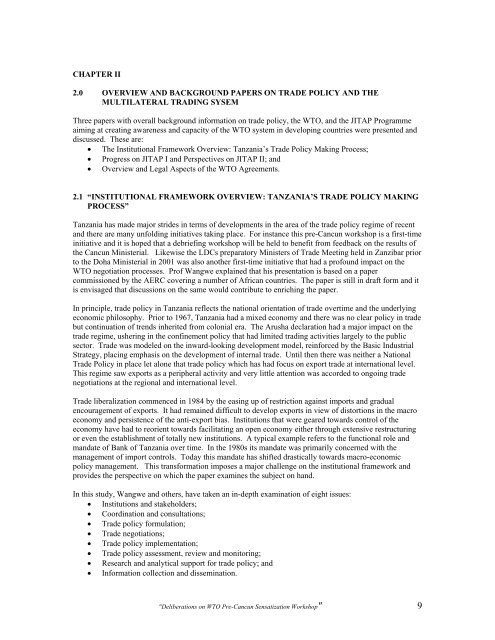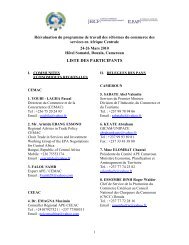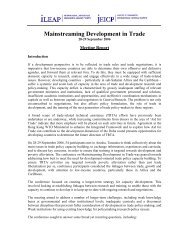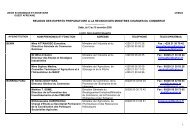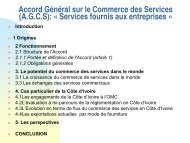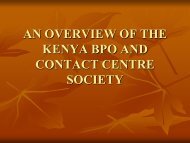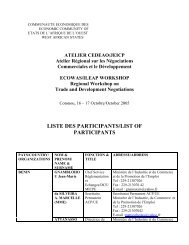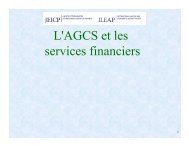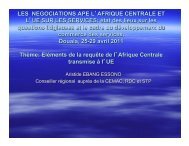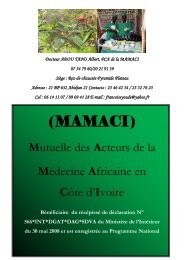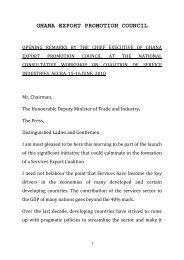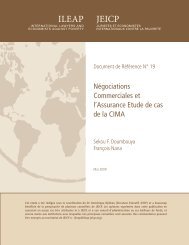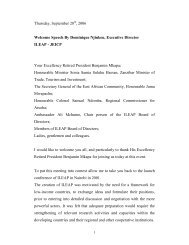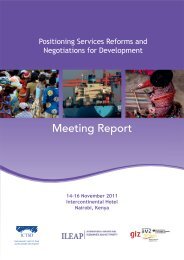Tanzania Report, Dar-Es-Salaam, Tanzania - ILEAP
Tanzania Report, Dar-Es-Salaam, Tanzania - ILEAP
Tanzania Report, Dar-Es-Salaam, Tanzania - ILEAP
You also want an ePaper? Increase the reach of your titles
YUMPU automatically turns print PDFs into web optimized ePapers that Google loves.
CHAPTER II2.0 OVERVIEW AND BACKGROUND PAPERS ON TRADE POLICY AND THEMULTILATERAL TRADING SYSEMThree papers with overall background information on trade policy, the WTO, and the JITAP Programmeaiming at creating awareness and capacity of the WTO system in developing countries were presented anddiscussed. These are:• The Institutional Framework Overview: <strong>Tanzania</strong>’s Trade Policy Making Process;• Progress on JITAP I and Perspectives on JITAP II; and• Overview and Legal Aspects of the WTO Agreements.2.1 “INSTITUTIONAL FRAMEWORK OVERVIEW: TANZANIA’S TRADE POLICY MAKINGPROCESS”<strong>Tanzania</strong> has made major strides in terms of developments in the area of the trade policy regime of recentand there are many unfolding initiatives taking place. For instance this pre-Cancun workshop is a first-timeinitiative and it is hoped that a debriefing workshop will be held to benefit from feedback on the results ofthe Cancun Ministerial. Likewise the LDCs preparatory Ministers of Trade Meeting held in Zanzibar priorto the Doha Ministerial in 2001 was also another first-time initiative that had a profound impact on theWTO negotiation processes. Prof Wangwe explained that his presentation is based on a papercommissioned by the AERC covering a number of African countries. The paper is still in draft form and itis envisaged that discussions on the same would contribute to enriching the paper.In principle, trade policy in <strong>Tanzania</strong> reflects the national orientation of trade overtime and the underlyingeconomic philosophy. Prior to 1967, <strong>Tanzania</strong> had a mixed economy and there was no clear policy in tradebut continuation of trends inherited from colonial era. The Arusha declaration had a major impact on thetrade regime, ushering in the confinement policy that had limited trading activities largely to the publicsector. Trade was modeled on the inward-looking development model, reinforced by the Basic IndustrialStrategy, placing emphasis on the development of internal trade. Until then there was neither a NationalTrade Policy in place let alone that trade policy which has had focus on export trade at international level.This regime saw exports as a peripheral activity and very little attention was accorded to ongoing tradenegotiations at the regional and international level.Trade liberalization commenced in 1984 by the easing up of restriction against imports and gradualencouragement of exports. It had remained difficult to develop exports in view of distortions in the macroeconomy and persistence of the anti-export bias. Institutions that were geared towards control of theeconomy have had to reorient towards facilitating an open economy either through extensive restructuringor even the establishment of totally new institutions. A typical example refers to the functional role andmandate of Bank of <strong>Tanzania</strong> over time. In the 1980s its mandate was primarily concerned with themanagement of import controls. Today this mandate has shifted drastically towards macro-economicpolicy management. This transformation imposes a major challenge on the institutional framework andprovides the perspective on which the paper examines the subject on hand.In this study, Wangwe and others, have taken an in-depth examination of eight issues:• Institutions and stakeholders;• Coordination and consultations;• Trade policy formulation;• Trade negotiations;• Trade policy implementation;• Trade policy assessment, review and monitoring;• Research and analytical support for trade policy; and• Information collection and dissemination."Deliberations on WTO Pre-Cancun Sensatization Workshop" 9


